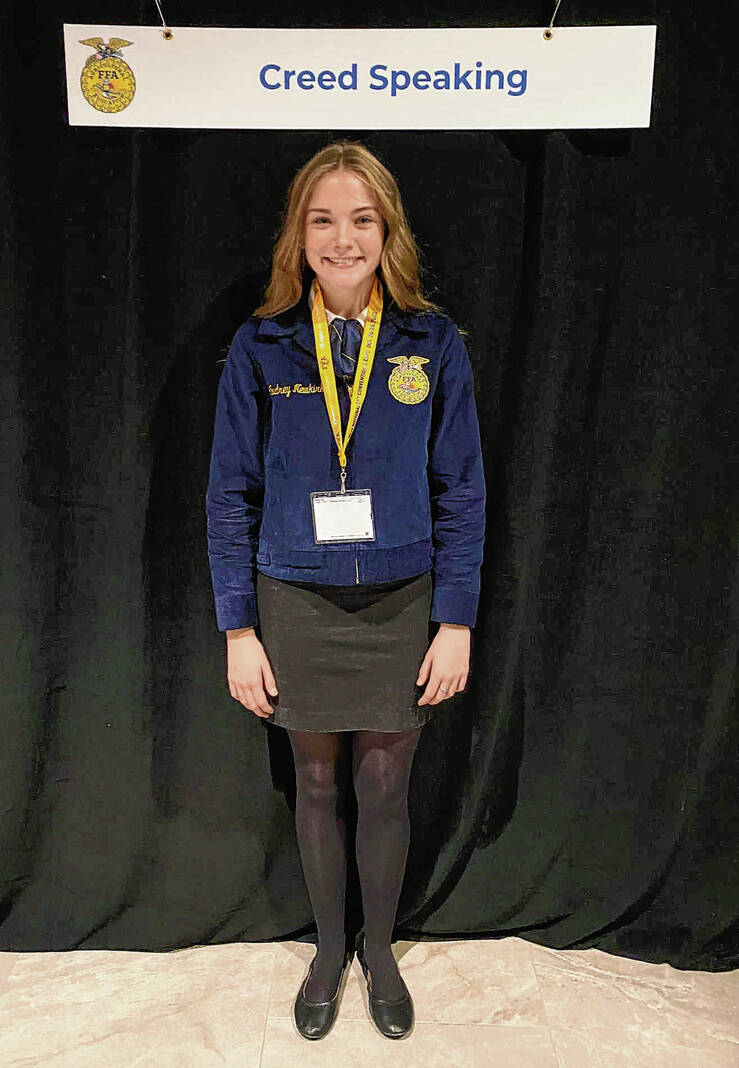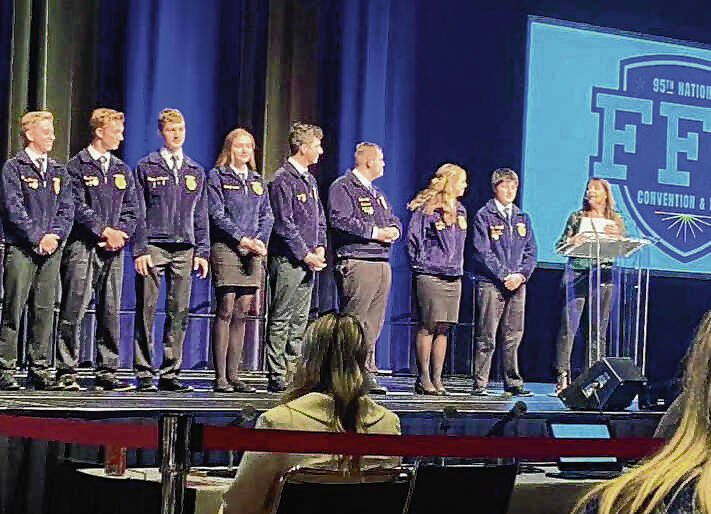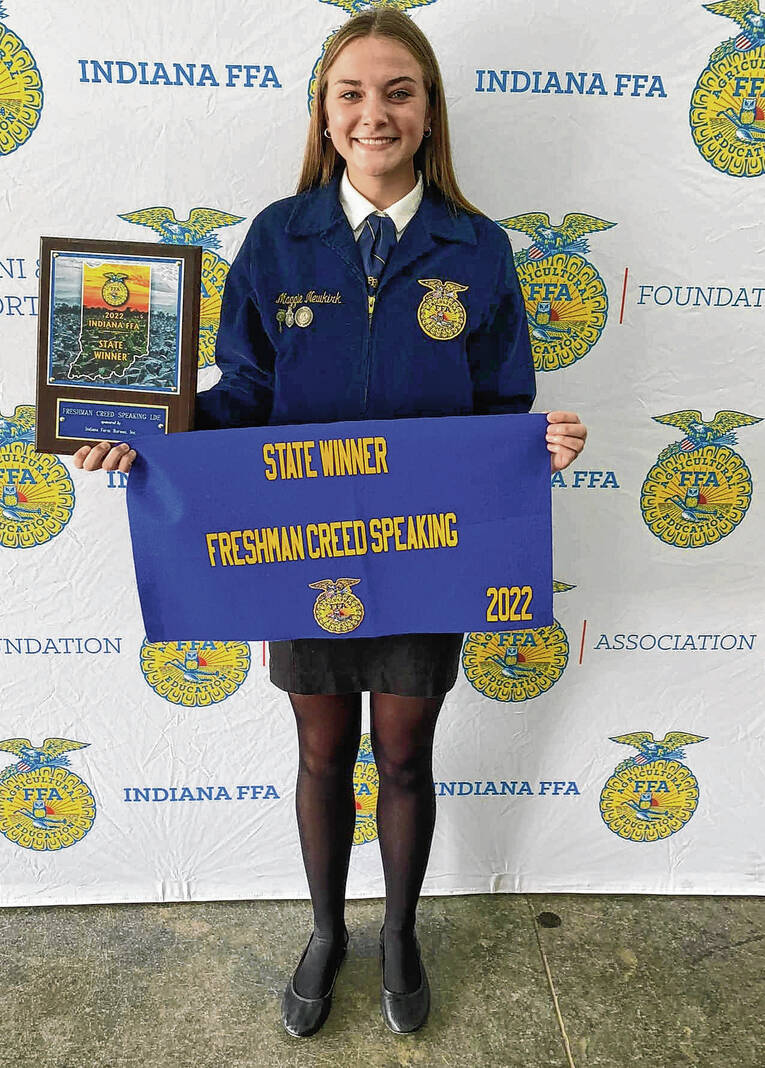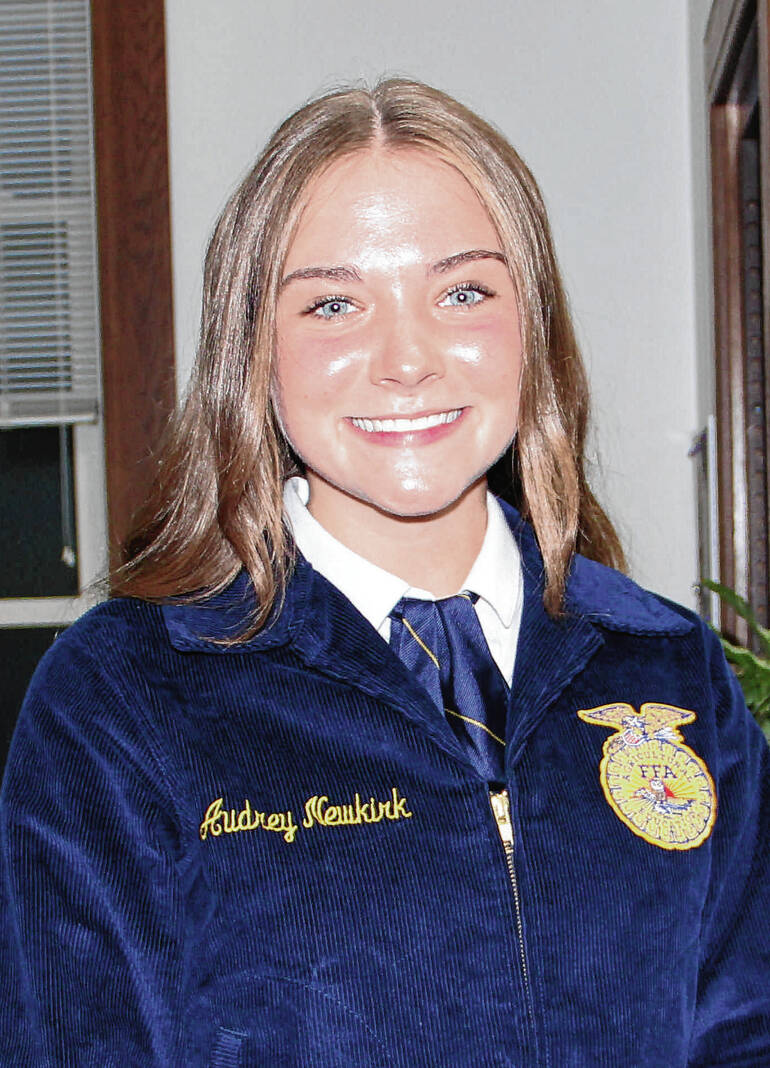Audrey Newkirk recited the FFA creed numerous times over the past year.
As a freshman at Seymour High School in the 2021-22 school year, she picked creed speaking as her leadership development event. That recognizes outstanding members in grades 7 through 9 for their ability to present the national FFA creed from memory and answer questions related to it.
Written by University of Wisconsin Department of Agricultural Education Professor Erwin Milton Tiffany in the summer of 1928, the creed outlines the organization’s values and beliefs regarding the industry of agriculture, FFA membership and citizenship and patriotism.
It was adopted at the third National FFA Convention, later was revised at the 38th and 63rd conventions and now consists of 258 words, six sentences and five paragraphs, according to ffa.org.
Reciting the creed has become in its own unique way a rite of passage.
All of the work Newkirk put in paid off, as she won the district contest in March and state contest in June and was a semifinalist (top 16) at the national level in October.
She was among eight contestants at district in Scottsburg and 12 at state and 52 at national, both in Indianapolis.
Newkirk, now 15 and a sophomore at SHS, said contestants can get dinged points if they begin speaking before the judges ask them to start reciting the creed, and they also can lose points if they miss any words of the creed.
Seymour FFA Adviser Micah Dillman said for district, the focus was on learning the creed without making mistakes. From there, Newkirk worked on the flow and presentation of the creed.
The district judges said Newkirk was a great, clear speaker, but she delivered the creed a bit too forceful and strong, so she worked on that going into the contest at the state convention.
“I think between district and state is where she made some really cool improvements,” Dillman said. “That’s when she got to understand what the words she was saying really meant, and she became more drawn to the words and just more expressive in the way that she connected with the words and use her voice fluctuation and presentation to draw you in as a crowd to also connect with those words.”
Newkirk agreed with that assessment.
“Not just saying the words but understanding them really helped me to put emotion and relatability into them,” she said. “There are lines like the joys and discomforts of agricultural life, and I do know the joys and discomforts because I’ve had to experience really great years of harvest on my family farm where we have a great outcome and then years when either there’s too much rain or there’s drought and we’ve had to face a lot of difficulties.”
The night she competed at the state convention, Newkirk learned she was in the top four. The next day onstage during a general session, she was announced as the winner.
“I was astounded,” she said. “I was just so excited for the opportunity, and I just immediately was thinking, ‘I’ve still got work to do’ because I was ready for something more. I was so excited that I got the opportunity.”
Newkirk’s preparation for the national convention included video calls with past national creed speakers, reciting the creed in ag classes at school and presenting the creed during Seymour City Council, Seymour Community School Corp. board of education and Premier Ag board meetings.
“It was a really cool experience to just learn comfortably and also meaningfully speaking in front of a lot of people,” she said.
At the national convention, the field of 52 contestants — one from each of the 50 states, Puerto Rico and U.S. Virgin Islands — was randomly divided in half for the preliminary round. They remained in a room without their cellphones or resources until their name was called to go before the judges.
The field was cut to 16 semifinalists, who had to recite the creed a second time. Then the final four had to do that for the third and final time.
Those top four were gold finalists, while five through 16 were silver finalists and the rest were bronze.
Newkirk joined FFA in seventh grade and competed in prepared public speaking that year and in eighth grade and both years made it to the state level, and she said her comfort with speaking in front of other people started several years earlier at church. Since then, she hasn’t felt nervous speaking in front of people.
“Of course, I wanted to place in the top four, but the experience alone just strengthened my public speaking skills so much. I can just tell the comfort this brings to be able to speak in front of people,” she said. “I was with these random kids I’ve never met my whole life all day long, and just getting to talk with them and see their stories and all that stuff was really cool.”
Having that natural ability of public speaking worked to Newkirk’s advantage, Dillman said.
“The FFA creed is tough language,” Dillman said. “We don’t speak that way nowadays, and her ability to comprehend what she’s saying and then use her speaking abilities to draw you in and to help you understand what she’s saying is really her strong suit because she understands it and then knows how to present it so that others can understand it. I wholeheartedly believe that’s what really separated her from other people because of that ability that she had.”
Dillman said she and the other Seymour FFA advisers were impressed with Newkirk.
“She exceeded any and every expectations we had of her, and I told her she taught me so much about not only just the process of having a national finalist, she taught me how to be a better adviser and how I can prep students better in the future for this contest,” Dillman said. “She has really worked hard and is very deserving. We’re just proud of her, and we’re excited to see what the future has in store for her.”
This school year, Newkirk said she’s going back to prepared public speaking for her leadership development event. That involves writing a speech on an agriculture topic, memorizing it and presenting it.
“I can start at district. I’ll write my own essay, and then hopefully, I can go to state again for that and be at another national competition,” she said.




